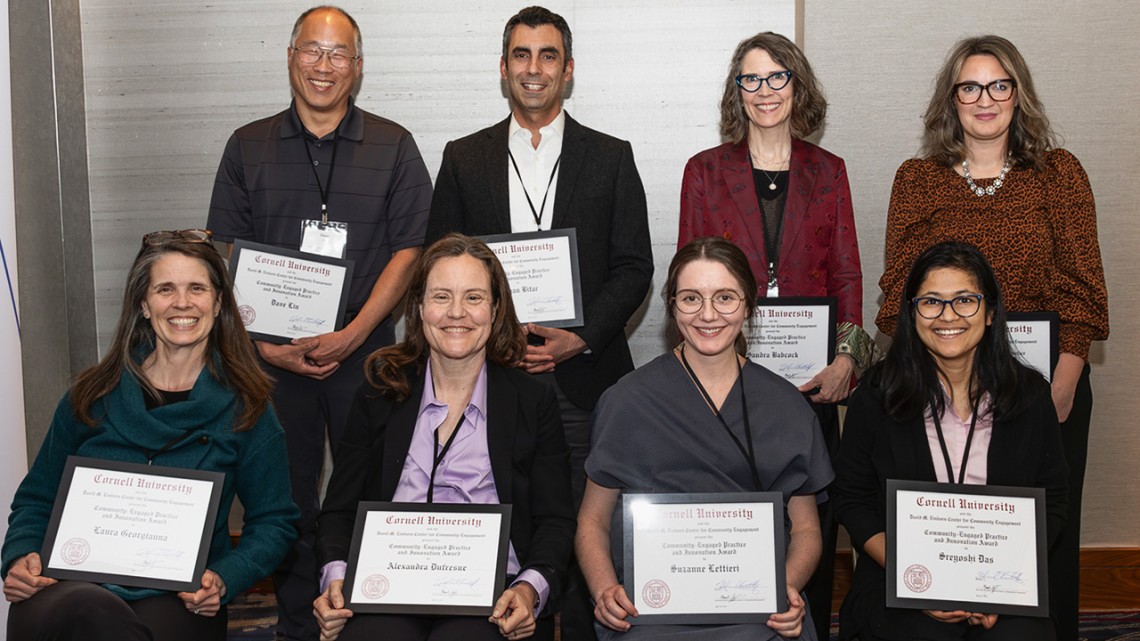
Community-Engaged Practice & Innovation Award recipients at the Einhorn Center’s 2nd Annual Community Engagement Awards.
News directly from Cornell's colleges and centers
Faculty awarded for creative, innovative community engagement
By Ashlee McGandy
Thirteen Cornell faculty members have received Community-Engaged Practice and Innovation Awards from the Einhorn Center for Community Engagement. The awards, given annually to one person from each of the university’s colleges and schools, recognize faculty who have recently developed community-engaged learning, leadership or research activities that create curricular and co-curricular opportunities for students.
“These awards join the nearly 800 awards, grants and fellowships the Einhorn Center has given to faculty advancing community-engaged learning at Cornell,” said Basil Safi, executive director of the Einhorn Center. “This year’s Community-Engaged Practice and Innovation Award recipients are working with K-12 students, policymakers, utility companies, healthcare workers and so many other partners to make positive change in communities. And they’re involving students in all aspects of this important work.”
Recipients of the 2023-24 Community-Engaged Practice and Innovation Awards are:
College of Agriculture and Life Sciences: Julie Ficarra, associate professor of practice, global development, co-developed and implements Culture, Communities and Development: From Ithaca to Quito, a community-engaged learning course and student exchange program that includes students from Cornell and the Universidad San Francisco de Quito in Ecuador, as well as community partners in both locations.
College of Architecture, Art and Planning: Suzanne Lettieri, assistant professor, architecture, teaches a community-engaged learning course that brings together Cornell architecture students and high school community partners. Through the seminar, Lettieri works to diversify the discipline by developing design tactics for inclusion and mentorship mechanisms.
College of Arts and Sciences: Derek Chang, associate professor, history, co-developed Cornell’s Public History Minor and seamlessly integrates community-engaged learning into a number of his courses. One is HIST/AAS 2043: Asian American Oral History, in which students gather oral histories from Asian American alumni, family members, Asian language instructors and Asian immigrant employees from Cornell Dining.
Cornell Brooks School of Public Policy: Alexandra Dufresne, professor of the practice and director and founder of State Policy Advocacy Clinic, through which undergraduate and master’s students have the opportunity to work with legislators; executive branch officials; academics; community members; and local, state and national NGOs on state-level policy initiatives.
Cornell Engineering: Eilyan Bitar, associate professor, electrical and computer engineering, has partnered with New York State Electric and Gas (NYSEG) since 2016 to understand how the growing adoption of electric vehicles will impact the power grid, and how to effectively coordinate EV charging patterns to minimize their collective strain on the grid.
College of Human Ecology: Heeju Park, associate professor, human centered design, has worked with on-campus partners, including the women’s hockey team and Cornell Dining, to develop new uniforms that better meet comfort and safety needs of those who wear them. He’s also worked with the men’s lacrosse team on uniforms that reference the indigenous community from which the sport emerged.
School of Industrial and Labor Relations: Esta Bigler, director, ILR's Labor & Employment Law Program, leads the reflective workshop and co-teaches the pre-course for the ILR School’s High Road New York Program. In partnership with ILR’s extension office, the program teaches students practical methods for civic engagement and leadership through economic justice, evidence-based policy and strategic development.
Cornell Law School: Sandra Babcock, clinical professor of law, International Human Rights Clinic, is the faculty director and founder of the Cornell Center on the Death Penalty Worldwide and the director of the Human Rights Clinic at Cornell Law School. She not only involves her students in these programs, she centers them as equal partners in her advocacy efforts.
Cornell SC Johnson College of Business: Laura Georgianna, senior lecturer of management and organizations, executive director – Leadership Programs, and Donald F. Douglas Director of the Roy H. Park Leadership Fellowship, Johnson Graduate School of Management, co-developed the innovative MBA Coaches program for the Dyson School’s community-engaged Grand Challenges curriculum.
College of Veterinary Medicine: Dave Lin, associate professor of neurobiology, biomedical sciences, founded Fall into Science in 2013. Since then, more than 150 graduate students in biomedical and biological sciences have made STEM-related presentations to more than 1,800 K-12 students in the Ithaca area.
Cornell Tech: Nicki Dell, associate professor, information and computer science, Jacobs Technion-Cornell Institute, co-founded (with Professor Tom Ristenpart) the Clinic to End Tech Abuse, a first-of-its-kind clinic to help survivors navigate technology abuse. The clinic was developed in partnership with the NYC Mayor’s Office to End Domestic and Gender-Based Violence. Dell also helps to lead the Home Health Care Work Initiative in the ILR School Center on Applied Research on Work.
Cornell Bowers Computing and Information Science: Sreyoshi Das, assistant professor of the practice, statistics and data science, partners with Cornell Cooperative Extension of Ulster County and the U.S. Geological Survey to better understand the effects of stream restoration projects on turbidity associated with storm events in the Ashokan Watershed.
Weill Cornell Medicine: Madeline Sterling, associate professor of medicine, division of general internal medicine, partners with the Training and Employment Fund of 1199SEIU, the United States’ largest healthcare union, to test and implement interventions among home health aides and attendants to improve their ability to care for patients in the home, while improving their own health.
Media Contact
Get Cornell news delivered right to your inbox.
Subscribe
